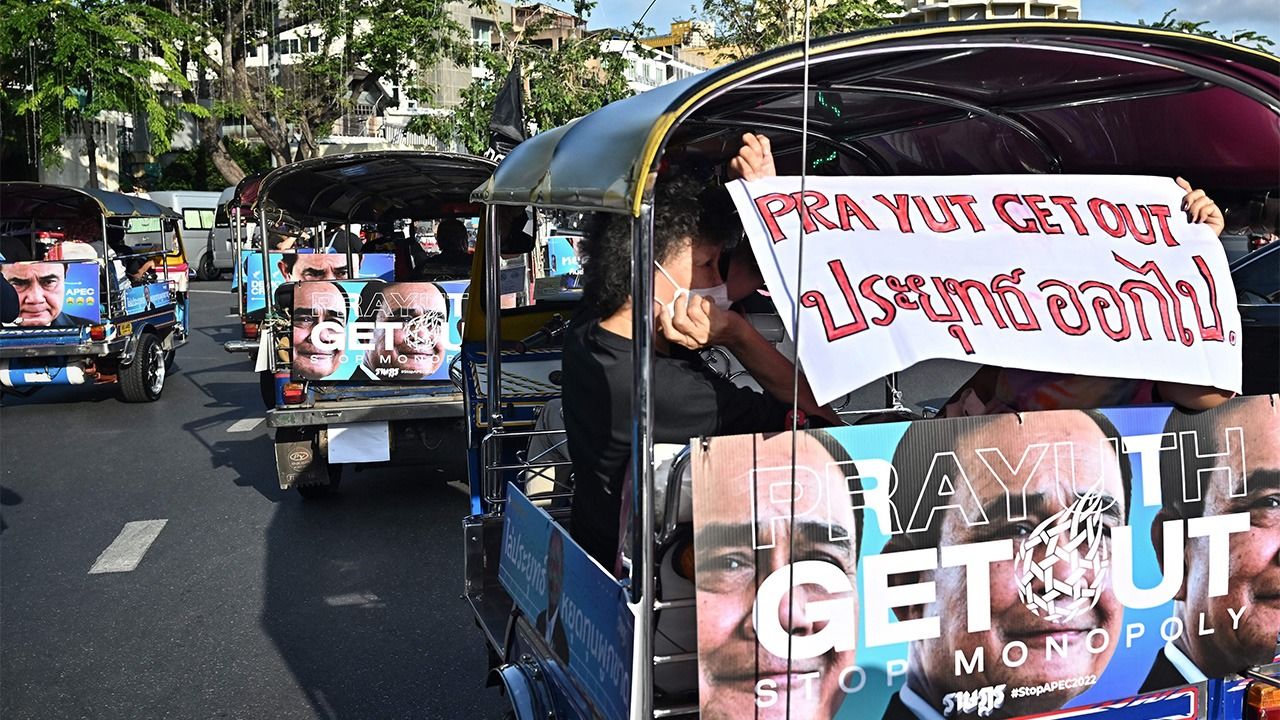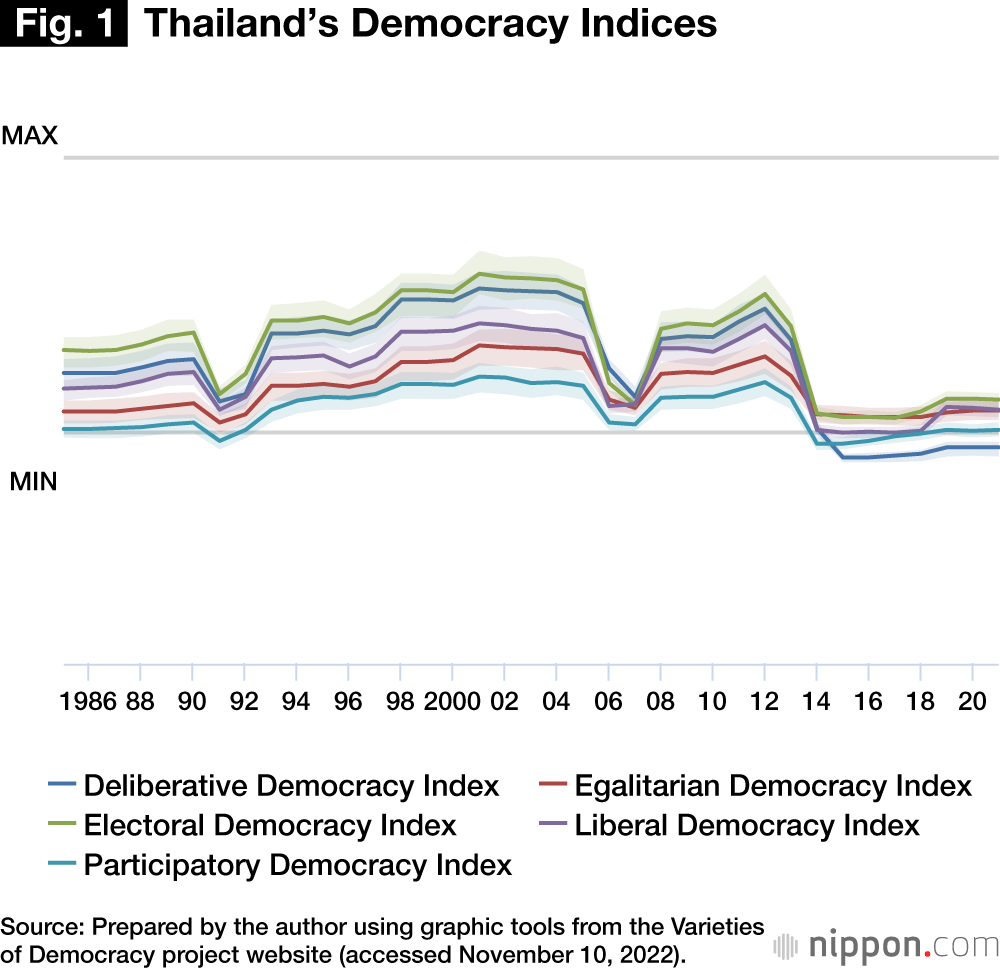
The Persistence of Authoritarian Regimes and Asia’s Long Road to Democracy
Democracy, Hold the Elections? The Logic of Authoritarianism in Thailand
World- English
- 日本語
- 简体字
- 繁體字
- Français
- Español
- العربية
- Русский
Thai Elections by the Military
A military junta has effectively held political power in Thailand since the May 2014 coup d’état. While the junta promised a return to civilian rule in 2019 when it allowed a parliamentary election to take place, the election took place under an electoral system designed to advantage the Palang Pracharath Party (PPRP)—the party the junta formed itself. The PPRP formed a coalition with other parties and nominated former army commander Prayut Chan-o-cha, the head of the military junta who was already prime minister, to continue in that position.
Opponents of the Prayut administration continue to demand a full return to civilian rule. Under the current Thai constitution, the term of the House of Representatives is due to expire in March 2023, and elections must be held by the end of May. The opposition Pheu Thai (For Thais) Party is expected to prevail in these elections, but the factors that impeded the holding of fair elections in 2019 persist, meaning that we cannot rule out the PPRP remaining in power.
In the 2019 House of Representatives election, Thailand’s Constitutional Court ruled against the Pheu Thai–aligned Thai Raksa Chart Party and forced its dissolution. Even if the Pheu Thai Party manages to contest the next House of Representatives election and comes close to a majority, it may be difficult for the party to nominate the prime minister. Under provisions in the current constitution, the prime minister is chosen by a majority of votes in a joint session of both houses of parliament. The House of Representatives has 500 elected members, while the Senate is comprised of 250 senators all appointed by the Royal Thai Armed Forces. With two-thirds of the necessary votes already in the bank, the PPRP and coalition partners only need to win 126 seats—about one-quarter—in the next lower house election to select the prime minister. Despite the existence of competitively contested elections, the fact that the public cannot fairly select their government through these contests means that Thailand will remain an authoritarian government for the foreseeable future.
Elections in a “Royal Democracy”
Thailand today is a hybrid authoritarian system that incorporates elections as a governance mechanism. However, not long ago, Thailand had stable changes of government through elections, and democracy seemed to be taking root. Based on the data compiled by the Varieties of Democracy project, Figure 1 below shows how measures of Thai democracy have evolved over time. Between 1992 and 2005, all indices, including the electoral democracy index, indicate that Thailand experienced free and fair elections. Thailand achieved its highest scores in 40 years during this period.
Interestingly enough, since even before this highwater mark in democratic governance, Thailand has consistently characterized its political system as a “democracy with the king as head of state” or “royal democracy.” This notion of royal democracy became more prominent from the late 1970s to the 1990s and continues until the present. Despite recent government actions that undermine Thailand’s claim to be a democracy, the government has not altered its assertion that its system is a democratic constitutional monarchy. I believe that the current period of authoritarianism has its roots in the increasing salience of the political ideal of Thailand being a “royal democracy.”
What does royal democracy or “democracy with the king as head of state” mean in the context of Thai politics? Referring to the leading Thai historian Nidhi Eoseewong, Tamada Yoshifumi, a specialist on Thai politics, suggests that it is a logic that recognizes elections and coups d’état equally as valid means of regime change. It was originally conceptualized by the Sarit Thanarat military junta (1959–63) and has been iteratively enshrined in Thailand’s political system since 1978. If parliamentary politics becomes tumultuous and threatens political stability, the army carries out a coup d’etat in the name of “fixing the situation.” The king will grant legitimacy to the junta on the assumption of an eventual return to civilian rule. If public criticism of the military regime became too high, the King would encourage the military to accelerate the return to democracy.
Crucial to the foundation of this system was the existence of King Bhumibol Adulyadej (1946–2016) acting as the “defender of democracy,” and the continued support of the public for the king and the royal system. During political crises such as the 1973 Thai popular uprising, when citizens demanded the resignation of the junta led by Thanom Kittikachorn, and the events of Black May in 1992, when the Suchinda Kraprayoon–led military regime clashed with forces demanding democracy, King Bhumibol gained tremendous support from the people by calling for the peaceful resolution of the conflict and urging a return to civilian rule. Prominent Thai political scientist Kasian Tejapira called this system the “Bhumibol Consensus,” noting that King Bhumibol maintained his legitimacy by acting as a balancing force between the military, political parties, and business elites.
The 1990s seemed to be a stable and peaceful period of political change in Thailand. However, the historian Thongchai Winichakul noted that at this time Thailand only appeared to be functioning as a parliamentary democracy on the surface, but was in fact an example of royal democracy, with elected power subject to the political influence and active intervention of the royal family and its supporters. During this period, there were simply no situations that required the intervention of the king, and thus no legal restrictions were placed on his authority, as is typical in most constitutional monarchies. Rather, Thongchai argues that the people actually supported the king being able to intervene politically due to his reputation as a “defender of democracy.”
In light of Thongchai’s and Kasian’s critiques and observations, Thailand was not a true parliamentary democracy in the 1990s but was a limited political system dependent on a balance of political forces, including the king, the military, and the people.
Tensions Between Two Types of “Democracy”
This system of royal democracy allows for a change of government through elections but does not preclude coups. The political clashes of the 2000s exposed the conflicting relationship between elections and military interventions. The catalyst for political tensions was former Prime Minister Thaksin Shinawatra. Thaksin won two landslide victories in national elections by promising to distribute wealth more broadly and by targeting low-income and rural residents, who made up the majority of Thai voters.
Thaksin’s supporters came to value elections as a means of policy determination, while the outnumbered middle class and urban residents believed that Thaksin was abusing the electoral system to exclude the minority. They also rejected the notion of the popular will and called for royal political intervention to eliminate “perverse” populist government. In the eyes of the bureaucracy, the army, the royal family, and other elites supporting the royals, Thaksin’s “politics of numbers” threatened to upset the balance under “democracy with the king as head of state.” They backed the anti-Thaksin faction and removed Thaksin’s government, as well as his sister Yingluck’s administration, through two military coups and three Constitutional Court rulings.
The 2014 military coup that removed Yingluck was initiated to suppress the forces of parliamentary democracy that now threatened the previous balance of power, thereby stabilizing the system of royal democracy. The current constitution, promulgated in 2017 under the military junta, tightened the constitutional amendment process and introduced an electoral system that makes it difficult for any one party to become the majority while establishing the aforementioned military-dominated system for nominating the prime minister. Prayut’s military junta then strengthened the suppression of parliamentary democracy by changing itself into a political party.
However, the Prayut administration’s blatantly authoritarian policies have increasingly aroused antipathy toward the current regime. This has resulted in greater calls for reforming the political system, including even reforming the monarchy. The antigovernment movement among young people, which intensified in 2020, opposes the idea of royal democracy and has called for the restoration of the rule of law and free and fair elections.
Prospects for Stabilizing Thailand’s Electoral Democracy
Prime Minister Prayut and the PPRP control the parliament as the ruling party, at the same time suppressing antigovernment forces while yielding the law as a weapon. With \ elections looming on the horizon in 2023, Prime Minister Prayut and the PPRP are stepping up their efforts to stay in power. However, even if the military junta remains in power after these elections, there is a “time limit” on their power.
The provision in the current 2017 Constitution for the Senate to participate in selecting the prime minister is a transitional measure that expires five years after the parliament is convened for the first time. With parliamentary elections taking place in 2019, this means the current method of selecting the prime minister is valid until May 2024. Given their past prowess in elections, this will give the pro-Thaksin Pheu Thai Party a chance to regain power through electoral means. If the system under the Constitution is changed, then Pheu Thai will call for the resignation of the cabinet or the dissolution of the House of Representatives in order to re-elect the prime minister from the lower house alone.
Will the return to power of the popular Pheu Thai Party portend an era of stable parliamentary democracy and peaceful transitions of power? Unfortunately, this is unlikely. After the death of King Bhumibol in 2016, the country continues to operate under the principles of royal democracy. Under the current constitution, the possibility still exists of the military intervening in politics through a coup with the support of the people, and with the approval and delegation of power by the king.
To prevent this, the Constitution must limit the king’s authority, explicitly outlaw coups, and ban the military from political intervention. Without such measures, Thailand’s parliamentary and electoral democracy cannot stand on its own and will continue to be limited based on what the king and the military allow. As participants in the 2020 political insurgency asserted, Thailand’s electoral democracy cannot be stabilized without reforming the political system, including the royal family.
However, currently only a minority of forces in the parliament seek such reforms. The PPRP and its coalition partners, and even the Pheu Thai Party, remain cautious about reforming the political system, especially the role of the monarchy. The risk of advocating reform was further heightened in 2021 when the Constitutional Court ruled against antigovernment activists for violating Article 49 of the Constitution, which prohibits the subversion of “democracy with the king as head of state.” If a party puts forward reform of the political system as part of its electoral manifesto during campaigning, it runs the risk of being disbanded by a ruling from the Constitutional Court. The prescription for stabilizing Thailand’s democracy is simple, but the road to its realization will likely be a very long one.
(Translated from Japanese. Banner photo: Thai prodemocracy forces protest against a ruling by Thailand’s Constitutional Court and call for Prime Minister Prayut Chan-o-cha to step down. Photo taken at Victory Monument in Bangkok on October 1, 2022. © Zuma Press/Kyodo News.)
